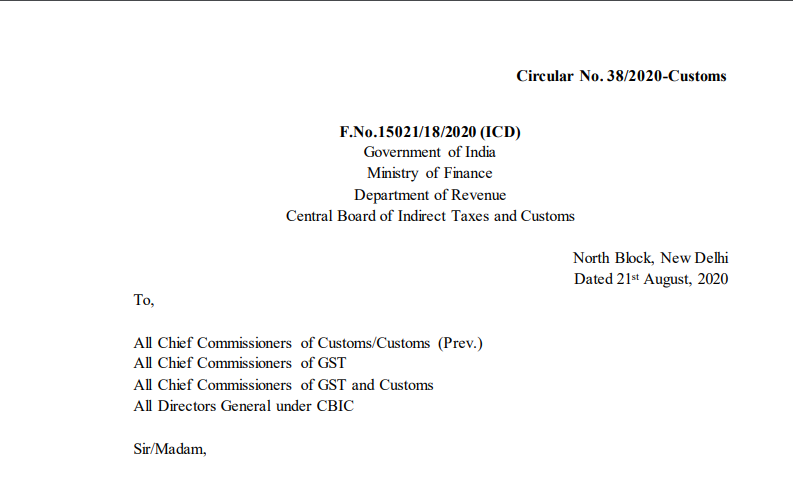Circular No. 38/2020-Customs
Circular No. 38/2020-Customs
To,
All Chief Commissioners of Customs/Customs (Prev.)
All Chief Commissioners of GST
All Chief Commissioners of GST and Customs
All Directors General under CBIC
Sir/Madam,
Subject: Guidelines regarding implementation of section 28DA of the Customs Act, 1962 and CAROTAR, 2020 in respect of Rules of Origin under Trade Agreements (FTA/PTA/CECA/CEPA) and verification of Certificates of Origin- reg.
Reference is drawn to Chapter VAA and section 28DA of the Customs Act, 1962, which has been inserted vide clause 110 of Finance Act, 2020, and to Customs (Administration of Rules of Origin under Trade Agreements) Rules, 2020 (hereafter referred to as the CAROTAR, 2020) issued vide Notification No. 81/2020-Customs (N.T.) dated 21st August, 2020.
1.1 The aforementioned section and rules aim to supplement the operational certification procedures related to implementation of the Rules of Origin, as prescribed under the respective trade agreements (FTA/PTA/CECA/CEPA) and notified under the customs notifications issued in terms of section 5 of the Customs Tariff Act, 1975 for each agreement.
1.2 The CAROTAR 2020 shall come into force on 21st September, 2020, to provide sufficient time for transition and to ensure that the prescribed conditions in terms of rule 4 are compiled with. Necessary modifications in bill of entry format are being made to allow declaration in terms of rule 3(a) and 3(d) of CAROTAR, 2020.
1.3 This circular aims to provide procedure for sending verification request to the Verification Authorities in exporting countries in terms of trade agreements, section 28DA and CAROTAR, 2020, and further guidelines for implementation of aforementioned section and rules.
2. The CAROTAR, 2020 and Rules of Origin notified for a trade agreement in terms of sub-section (1) of section 5 of the Customs Tariff Act, 1975, broadly provide the following grounds for verification:
a) In case of a doubt regarding the genuineness of the Certificate of Origin (CoO) such as any deficiency in the format of the certificate or mismatch of signatures or seal when compared with specimens on record.
b) In case of a doubt on the accuracy of information regarding origin, i.e. where a doubt arises on whether the product qualifies as an originating good under the relevant Rules of Origin. In other words, these are cases where there is a reasonable belief that a product is not grown or not produced/manufactured in a particular country or required value addition/change in CTH/PSR etc., as the case may be, has not been achieved for the goods to qualify as originating.
c) Verification could also be undertaken on random basis as a measure of due diligence. For this purpose, factors such as the quantum of duty being foregone, the nature of goods vis-à-vis the country of origin, commodities that are prone to misdeclaration of country of origin, compliance record of the importer etc., may be given regard while selecting Certificates of Origin for random verification.
3. The Rules of Origin, by virtue of which a good attains origin of a country, have evolved with subsequent reviews of trade agreements. Most trade agreements have moved from single general rule to specific rule for most of the tariff lines, with inclusion of vast array of processes which can confer origin. Section 28DA makes it incumbent upon an importer to possess sufficient information as regards the manner in which country of origin criteria, including the regional value content and product specific criteria, specified in the Rules of Origin in the trade agreement, are satisfied. For this purpose, CAROTAR, 2020 has provided a form, containing list of basic minimum information which an importer is required to obtain while importing goods under claim of preferential rate of duty. Therefore, in case there is a doubt with regard to origin of goods, information should be first called upon from the importer of the goods, in terms of rule 5 read with rule 4 of CAROTAR, 2020, before initiating verification with the partner country in terms of rule 6.
Related Topic:
Basic Provisions of Customs Law and Taxability of Import of Goods
3.1 Section 28DA of the Act further states that mere submission of a certificate of origin shall not absolve the importer of the responsibility to exercise reasonable care to the accuracy and truthfulness of the information supplied. In case an importer fails to provide information in terms of section 28DA(1) (iii) of the Act and as prescribed under CAROTAR, 2020, or does not exercise reasonable care to ensure the accuracy and truthfulness of the information furnished, this fact should be informed to Risk Management Centre of Customs (RMCC) through written communication for the purposes of enabling compulsory verification of assessment of all subsequent import consignments in terms of rule 8(1) of CAROTAR, 2020. However, the compulsory verification of assessment should be discontinued once the importer demonstrates that he has established adequate system of controls to exercise reasonable care as required under the Act.
Read & Download the Full Circular in pdf:
If you already have a premium membership, Sign In.
 ConsultEase Administrator
ConsultEase Administrator
Consultant
Faridabad, India
As a Consultease Administrator, I'm responsible for the smooth administration of our portal. Reach out to me in case you need help.













